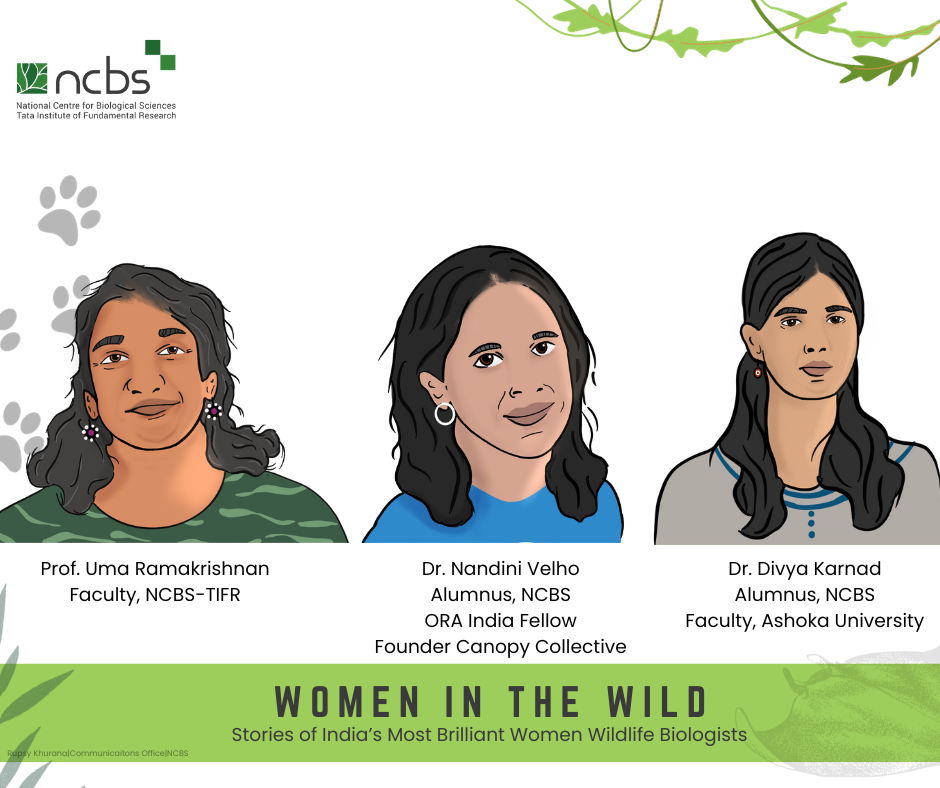We are thrilled to announce the launch of the book ‘WOMEN IN THE WILD: Stories of India’s Most Brilliant Women Wildlife Biologists’, which shines a light on some of the phenomenal scientists who spearhead extraordinary endeavours of conserving India’s wildlife.
We are proud that the collection features Prof. Uma Ramakrishnan, faculty at NCBS-TIFR, and Dr. Divya Karnad and Dr. Nandini Velho, alumni from our MSc Wildlife Biology and Conservation Program.
The anthology edited by Anita Mani offers a glimpse into the breathtaking range of scientific work in conservation biology. The book, by no means exhaustive, is an eclectic mix of essays on women working for wildlife conservation through nature education, research, and engagement with communities and government. It is a vivid illustration of the daunting yet inspiring journeys of women scientists whose courage and optimism to protect wildlife and landscapes of India, appears to be uninterrupted by the messiness of life.
“This book is the first step in recognizing the diversity of ways that people contribute to wildlife science and the pivotal role of women in the field of wildlife science and conservation”, says Dr Karnad. She is now a faculty at Ashoka University and works on identifying and connecting sustainable fisheries with better markets in the country. She is the co-founder of InSeason Fish, a sustainable food initiative. She is one of the few marine biologists who works on the conservation of sharks and rays in India.
The book takes you through the past and peeps into the future reassuring young women who aspire to contribute to the conservation of wildlife. “In those days being able to meet or hear about women working on wildlife was a rarity; a matter of luck.”, Dr. Karnad reflects on her early days in the field. She believes that such books can make these stories mainstream encouraging more women to follow their wild dreams and break stereotypes of machismo associated with field work.
Prof. Uma Ramakrishnan has been working in wildlife conservation for more than two decades. “As scientists, we uncover new information and tell our research stories through papers. But, it is always inspiring and fun to learn more about the journey of individuals behind the research”, she says.
There are more women in science now than ever before, yet they make less than a third of the workforce in the world. “Most women in India have unspoken burdens and expectations from society and their families”, adds Prof. Ramakrishnan. She hopes that reading about the work of these amazing women, especially in times of despair, can inspire women to continue their journey in wildlife conservation.
Being a woman in any field is onerous but being a field biologist comes with its challenges. Working in the remotest part of the country, away from family, sexism, mental and sexual abuse, and lack of even basic hygiene facilities keeps the gap wide enough for most women to leap.
Dr. Nandini Velho, ORA India Fellow, Founder and Project Lead, Canopy Collective, embraces all efforts in addressing various issues that women grapple with in conservation science. She says, much needs to be done, and social media accounts like 'Women in the Wild' or student conferences that highlight the dubious hierarchical systems that the previous generation is aware of, are a good first step. She says, "An effort to promote greater representation, whether in terms of gender, caste, religion, or region and the concurrent shift of power towards leadership positions, will bring about further change."
Women in conservation biology are smashing glass ceilings and their dedication towards India’s wildlife needs to reach far and wide.










0 Comments